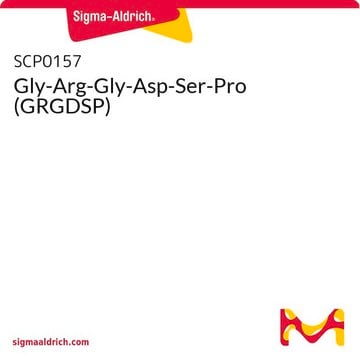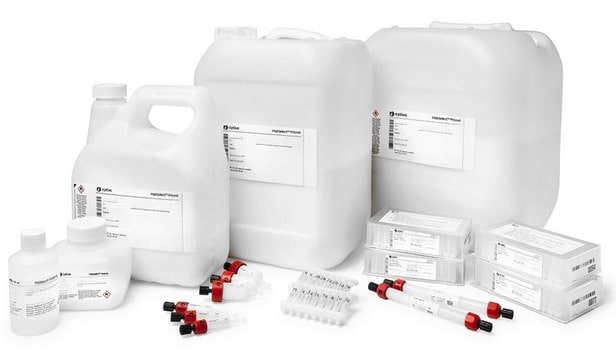All Photos(1)
About This Item
Empirical Formula (Hill Notation):
C23H39N9O10
Molecular Weight:
601.61
UNSPSC Code:
12352209
NACRES:
NA.32
Recommended Products
Assay
≥95% (HPLC)
form
lyophilized
composition
Peptide Content, ≥65%
storage condition
protect from light
storage temp.
−20°C
Amino Acid Sequence
Gly-Arg-Ala-Asp-Ser-Pro
General description
GRADSP, an integrin non-binding peptide, may be used as a negative control in studies with integrin-blocking peptides such as RGDS (Arg-Gly-Asp-Ser) and GRGDSP (Gly-Arg-Gly-Asp-Ser-Pro).
Gly-Arg-Ala-Asp-Ser-Pro (GRADSP), an integrin non-binding peptide, may be used as a negative control in studies with integrin-blocking peptides such as Arg-Gly-Asp-Ser (RGDS) and Gly-Arg-Gly-Asp-Ser-Pro (GRGDSP).
Application
Gly-Arg-Ala-Asp-Ser-Pro (GRADSP) has been used as a negative control to observe the role of the Arg-Gly-Asp (RGD)-binding integrins in Gal-3-mediated cell adhesion. It has also been used as a control peptide to block the RGD-dependent integrins/integrin signaling.
Storage Class Code
11 - Combustible Solids
WGK
WGK 3
Flash Point(F)
Not applicable
Flash Point(C)
Not applicable
Certificates of Analysis (COA)
Search for Certificates of Analysis (COA) by entering the products Lot/Batch Number. Lot and Batch Numbers can be found on a product’s label following the words ‘Lot’ or ‘Batch’.
Already Own This Product?
Find documentation for the products that you have recently purchased in the Document Library.
Customers Also Viewed
U Stäubli et al.
The Journal of neuroscience : the official journal of the Society for Neuroscience, 18(9), 3460-3469 (1998-05-09)
The integrin antagonist Gly-Arg-Gly-Asp-Ser-Pro (GRGDSP) was applied by local ejection to one of two recording sites in hippocampal slices at various times before and after long-term potentiation (LTP) was induced at both sites with theta burst stimulation. Applications 10 min
Major role of the extracellular matrix in airway smooth muscle phenotype plasticity
Dekkers BGJ
American Journal of Respiratory and Critical Care Medicine, 181(6), 556-565 (2010)
Julia Dotterweich et al.
Cell communication and signaling : CCS, 12, 36-36 (2014-06-27)
CCN family member 1 (CCN1), also known as cysteine-rich angiogenic inducer 61 (CYR61), belongs to the extracellular matrix-associated CCN protein family. The diverse functions of these proteins include regulation of cell migration, adhesion, proliferation, differentiation and survival/apoptosis, induction of angiogenesis
Antonín Sedlář et al.
International journal of molecular sciences, 22(10) (2021-06-03)
Galectin-3 (Gal-3) is a β-galactoside-binding protein that influences various cell functions, including cell adhesion. We focused on the role of Gal-3 as an extracellular ligand mediating cell-matrix adhesion. We used human adipose tissue-derived stem cells and human umbilical vein endothelial
Our team of scientists has experience in all areas of research including Life Science, Material Science, Chemical Synthesis, Chromatography, Analytical and many others.
Contact Technical Service












